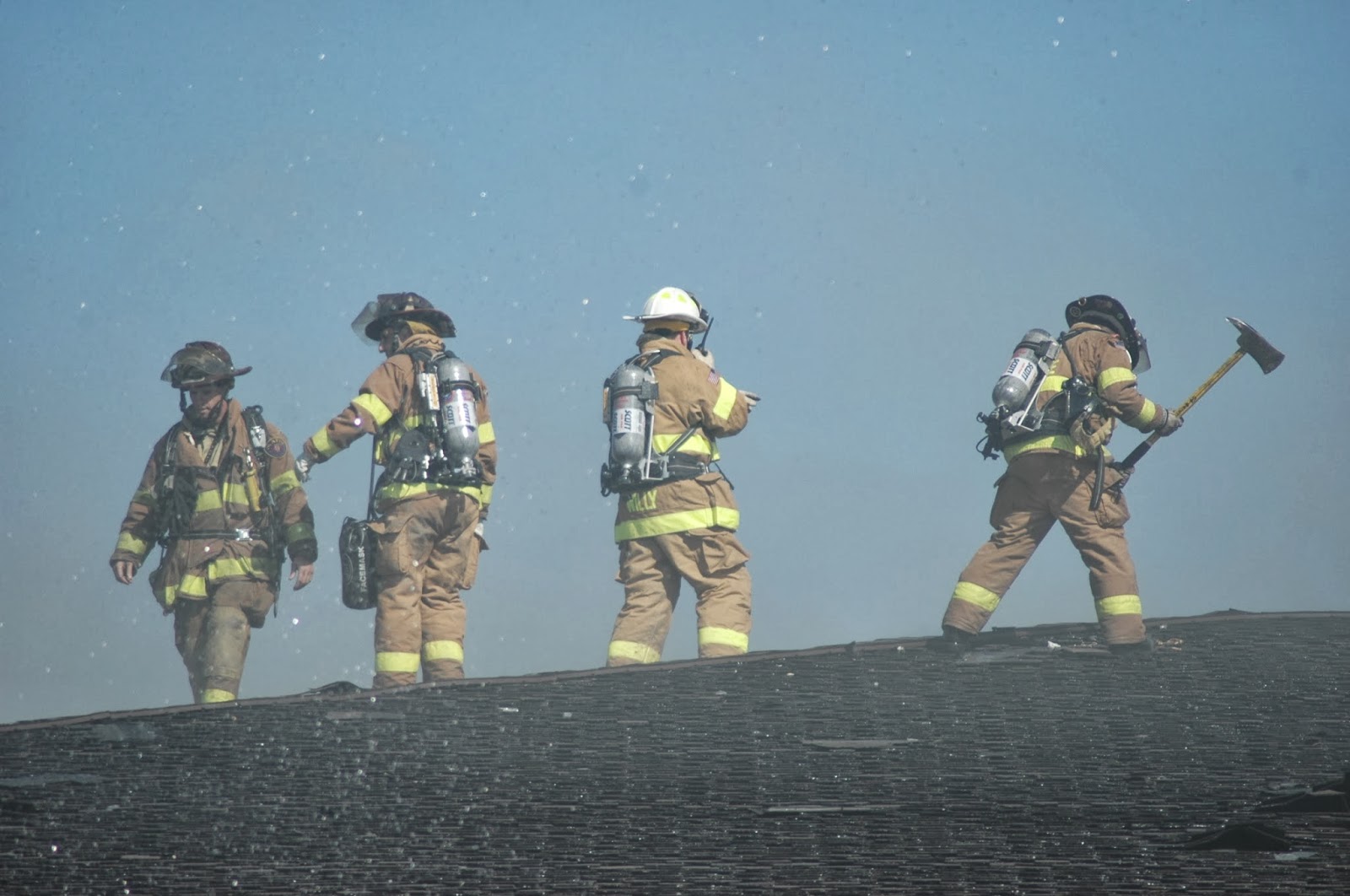Sometimes you know what you want to be when you grow up.
Maybe you’re following in the steps of a role model. Perhaps a teacher or
counselor has offered you guidance. Or maybe your inspiration comes from a
favorite television show. The latter is true for Kyle Carlson.
 |
| Kyle Carlson (facing forward) |
Kyle is a firefighter for the city of Olathe. “You remember
that television show that was on in the 1970s, ‘Emergency’?” Kyle asked. “I got to watching it every time it came
on.” He can’t exactly articulate what it was about the show that caught his
attention – he was only a grade-schooler at the time. But something about
watching the paramedics who worked out of the Los Angeles County Fire
Department resonated with Kyle.
He became a firefighter/emergency medical technician in
1990, and works out of Station 5, near Kansas 7 and Spruce Street in Olathe. He
is trained to fight all sorts of fires, work accident scenes, join in water
rescues, offer medical assistance. “It’s exciting,” Kyle said. “I love my job.
If I ever get hurt, I don’t know what I’ll do.”
Kyle works a 24-hour shift on three out of five days, then
has four days off in a row. He said that on average, his station receives five
calls a day. Each day, and each call, brings an unknown. It could be a house
fire, an attempted suicide, a person with chest pains, or victims needing to be
extricated from wrecked vehicles. When he’s not on a call, he is checking
equipment, keeping the fire station in order, and going for special training. Recently
he participated in search and rescue training. “We don’t just sit there and
play cards and watch TV,” Kyle said.
When a call comes in, the radio crackles to life with the
voice of a computerized dispatcher announcing what and where. If it comes while
the firefighters are sleeping, lights pop on. “We are supposed to be out the
door in less than a minute,” Kyle said, “closer to 30 seconds if it’s a medical
call.” Newer fire stations are generally built all on one level, so there are
no stairs to impede, and no pole to slide down. Kyle said he usually wears his
fire pants, but waits until he arrives at the scene to put on the rest of his
gear. That’s because he drives the pump truck, which carries 500 gallons of
water and is shorter than a ladder truck, and that extra gear is bulky when
you’re trying to drive. Even though the gear is lighter than it used to be, it
still weighs roughly 60 pounds.
Five trucks are dispatched to a fire scene. Kyle’s job
varies depending on when he arrives. If he is first on the scene at a fire, he
immediately begins pumping water. Otherwise, he might help assist hooking up
hose to a fire hydrant or searching for victims.
There is an element of danger to many calls, especially
those involving fires. “I had a ceiling fall on me,” Kyle said. “We went to a
house fire. It was a big, big house. We stepped into what was the office, and
heard a noise. The weight of the water pushed the ceiling down.” Another time,
Kyle almost fell through the floor of a house that had caught on fire as it was
being remodeled, but caught himself in time.
While these incidents can be harrowing, Kyle doesn’t focus
on that aspect. He said his wife, Jenni, whom he met after he became a
firefighter, doesn’t worry a lot either. She agreed, but said she does pay
close attention to the news when she hears reports of a fire or car wreck, just
to see if Kyle’s crew is involved.
Kyle has come to the rescue of more people than he can
probably count, but he has seen his share of fatalities too. The worst experience
for him was in 2004. “It was a house fire,” he said. “A mom, dad, and their
three boys all died. Afterwards, we immediately all went for a session with the
chaplain.”
A bright spot of the job is the thanks that firefighters
receive from those in the community they have helped. Kyle said people stop by with
brownies, or dinners. The praise is appreciated, but isn’t really necessary. “We
don’t consider ourselves heroes,” Kyle said. “We’re just doing our job.”





